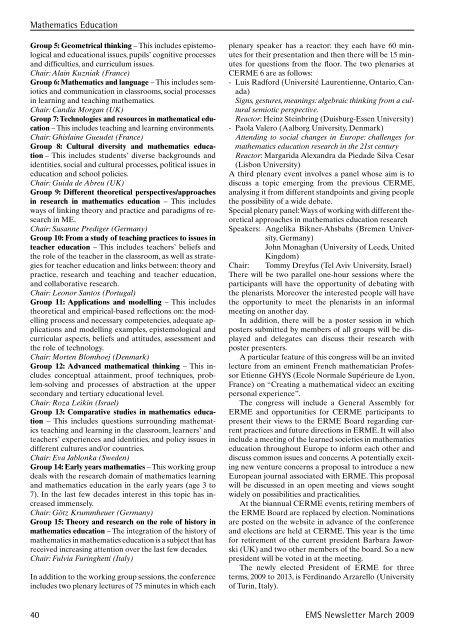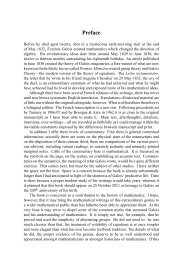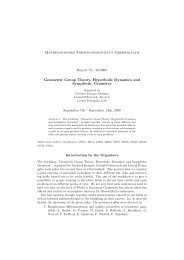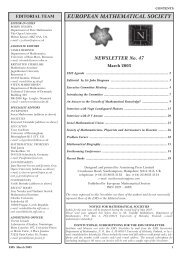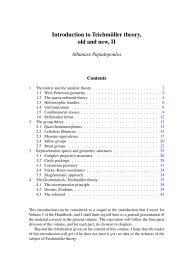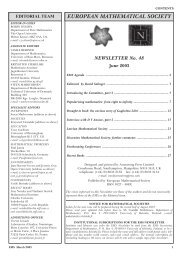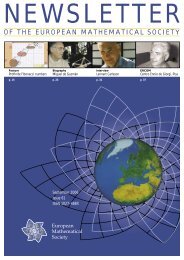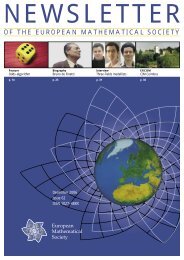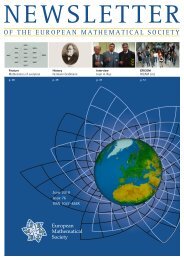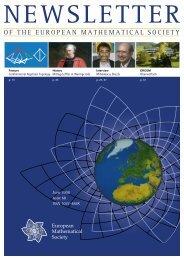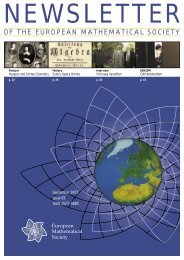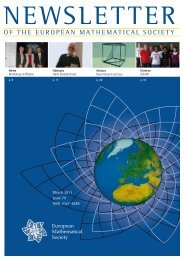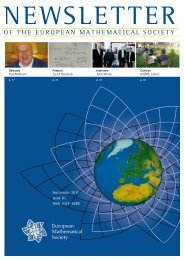New from Springer - European Mathematical Society Publishing ...
New from Springer - European Mathematical Society Publishing ...
New from Springer - European Mathematical Society Publishing ...
You also want an ePaper? Increase the reach of your titles
YUMPU automatically turns print PDFs into web optimized ePapers that Google loves.
Mathematics Education<br />
Group 5: Geometrical thinking – This includes epistemological<br />
and educational issues, pupils’ cognitive processes<br />
and diffi culties, and curriculum issues.<br />
Chair: Alain Kuzniak (France)<br />
Group 6: Mathematics and language – This includes semiotics<br />
and communication in classrooms, social processes<br />
in learning and teaching mathematics.<br />
Chair: Candia Morgan (UK)<br />
Group 7: Technologies and resources in mathematical education<br />
– This includes teaching and learning environments.<br />
Chair: Ghislaine Gueudet (France)<br />
Group 8: Cultural diversity and mathematics education<br />
– This includes students’ diverse backgrounds and<br />
identities, social and cultural processes, political issues in<br />
education and school policies.<br />
Chair: Guida de Abreu (UK)<br />
Group 9: Different theoretical perspectives/approaches<br />
in research in mathematics education – This includes<br />
ways of linking theory and practice and paradigms of research<br />
in ME.<br />
Chair: Susanne Prediger (Germany)<br />
Group 10: From a study of teaching practices to issues in<br />
teacher education – This includes teachers’ beliefs and<br />
the role of the teacher in the classroom, as well as strategies<br />
for teacher education and links between: theory and<br />
practice, research and teaching and teacher education,<br />
and collaborative research.<br />
Chair: Leonor Santos (Portugal)<br />
Group 11: Applications and modelling – This includes<br />
theoretical and empirical-based refl ections on: the modelling<br />
process and necessary competencies, adequate applications<br />
and modelling examples, epistemological and<br />
curricular aspects, beliefs and attitudes, assessment and<br />
the role of technology.<br />
Chair: Morten Blomhoej (Denmark)<br />
Group 12: Advanced mathematical thinking – This includes<br />
conceptual attainment, proof techniques, problem-solving<br />
and processes of abstraction at the upper<br />
secondary and tertiary educational level.<br />
Chair: Roza Leikin (Israel)<br />
Group 13: Comparative studies in mathematics education<br />
– This includes questions surrounding mathematics<br />
teaching and learning in the classroom, learners’ and<br />
teachers’ experiences and identities, and policy issues in<br />
different cultures and/or countries.<br />
Chair: Eva Jablonka (Sweden)<br />
Group 14: Early years mathematics – This working group<br />
deals with the research domain of mathematics learning<br />
and mathematics education in the early years (age 3 to<br />
7). In the last few decades interest in this topic has increased<br />
immensely.<br />
Chair: Götz Krummheuer (Germany)<br />
Group 15: Theory and research on the role of history in<br />
mathematics education – The integration of the history of<br />
mathematics in mathematics education is a subject that has<br />
received increasing attention over the last few decades.<br />
Chair: Fulvia Furinghetti (Italy)<br />
In addition to the working group sessions, the conference<br />
includes two plenary lectures of 75 minutes in which each<br />
plenary speaker has a reactor: they each have 60 minutes<br />
for their presentation and then there will be 15 minutes<br />
for questions <strong>from</strong> the fl oor. The two plenaries at<br />
CERME 6 are as follows:<br />
- Luis Radford (Université Laurentienne, Ontario, Canada)<br />
Signs, gestures, meanings: algebraic thinking <strong>from</strong> a cultural<br />
semiotic perspective.<br />
Reactor: Heinz Steinbring (Duisburg-Essen University)<br />
- Paola Valero (Aalborg University, Denmark)<br />
Attending to social changes in Europe: challenges for<br />
mathematics education research in the 21st century<br />
Reactor: Margarida Alexandra da Piedade Silva Cesar<br />
(Lisbon University)<br />
A third plenary event involves a panel whose aim is to<br />
discuss a topic emerging <strong>from</strong> the previous CERME,<br />
analysing it <strong>from</strong> different standpoints and giving people<br />
the possibility of a wide debate.<br />
Special plenary panel: Ways of working with different theoretical<br />
approaches in mathematics education research<br />
Speakers: Angelika Bikner-Ahsbahs (Bremen University,<br />
Germany)<br />
John Monaghan (University of Leeds, United<br />
Kingdom)<br />
Chair: Tommy Dreyfus (Tel Aviv University, Israel)<br />
There will be two parallel one-hour sessions where the<br />
participants will have the opportunity of debating with<br />
the plenarists. Moreover the interested people will have<br />
the opportunity to meet the plenarists in an informal<br />
meeting on another day.<br />
In addition, there will be a poster session in which<br />
posters submitted by members of all groups will be displayed<br />
and delegates can discuss their research with<br />
poster presenters.<br />
A particular feature of this congress will be an invited<br />
lecture <strong>from</strong> an eminent French mathematician Professor<br />
Etienne GHYS (Ecole Normale Supérieure de Lyon,<br />
France) on “Creating a mathematical video: an exciting<br />
personal experience”.<br />
The congress will include a General Assembly for<br />
ERME and opportunities for CERME participants to<br />
present their views to the ERME Board regarding current<br />
practices and future directions in ERME. It will also<br />
include a meeting of the learned societies in mathematics<br />
education throughout Europe to inform each other and<br />
discuss common issues and concerns. A potentially exciting<br />
new venture concerns a proposal to introduce a new<br />
<strong>European</strong> journal associated with ERME. This proposal<br />
will be discussed in an open meeting and views sought<br />
widely on possibilities and practicalities.<br />
At the biannual CERME events, retiring members of<br />
the ERME Board are replaced by election. Nominations<br />
are posted on the website in advance of the conference<br />
and elections are held at CERME. This year is the time<br />
for retirement of the current president Barbara Jaworski<br />
(UK) and two other members of the board. So a new<br />
president will be voted in at the meeting.<br />
The newly elected President of ERME for three<br />
terms, 2009 to 2013, is Ferdinando Arzarello (University<br />
of Turin, Italy).<br />
40 EMS <strong>New</strong>sletter March 2009


